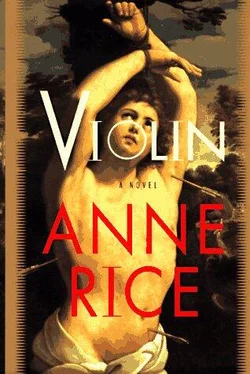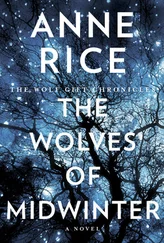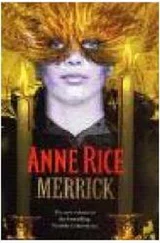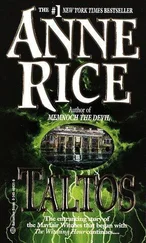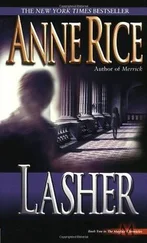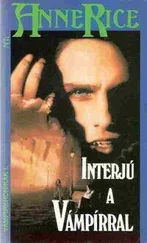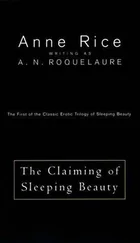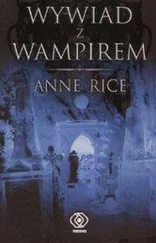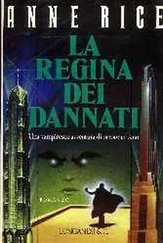I sat straight. Frau Weber hastened to plump up the pillows behind me. I looked down to see I wore a bed jacket of padded silk,
tied at the neck, and beneath that, white flannel, very fine. I was modest. I was even clean.
I looked at my hands, then realizing I had let go the violin, I snatched it up and held it.
There had been no hasty movement on the part of my tragic ghost. He had not stirred.
"Madam, you are safe. That is the Count, in the drawing room, would you please to let him in?"
I saw him in the open doorway; the beige doors were leather and thickly padded, and they came in two sets, to seal off all sound perhaps when these rooms were locked apart. He stood there with his wooden cane, the old gray-haired man I had seen on the pavement below, with the white beard and mustache, an old-fashioned figure and pretty, actually, like the venerable old actors in black-and-white films, so divinely Old World.
"Are you well, my child?" he asked. Thank God it was English. He was very far away. How big these spaces were, big as the spaces of Stefan's palace.
Blast. Flames. Old World.
"Yes, sir, I am, thank you," I said. "I'm relieved that you speak English. My German’s wretched. I thank you for all your kindness to me. I don't want to be the slightest burden to you."
It was enough to say. Grady could pay the bills. Grady could make everything plain. That's what came with money, that others did the explaining. Karl had taught me that. How could I say I did not need this man's hospitality, his charity? There was some greater, finer point to be made.
"Please do come in," I said. "I'm so sorry, so sorry. .
"For what are you sorry, child?" he asked.
He made his limping path towards the bed. Only now I saw the curlicued footboard. And beyond, the chandelier of the other room. Yes, a palace, the Hotel Imperial.
The old man wore some sort of medallion around his neck, and his coat was trimmed in black velvet. It hung unevenly from his shoulders. His white beard looked brushed.
Stefan didn't move. I looked at Stefan and Stefan looked at me. Defeat and sorrow. Even in the angle of his head I saw it, the way he rested against the wall, as though whatever particles were left to him could know fatigue, or knew it even more now, and were knit together ever more precariously. His lips moved just a little as he eyed me, a face speaking to a face, his, mine.
Herr Melniker had rushed to get a big blue velvet fauteuil for the Count, one of the many white and gold chairs scattered about on the inevitable Rococo tiptoe.
He sat at a polite distance.
A pleasant aroma came to me.
"Hot chocolate," I said.
"Yes," Frau Weber said. She put the cup in my hands.
"You are so very kind." I clasped the violin with my left arm. "If you would set the saucer there."
The old man gazed at me in adoring wonder, the way old men would look at me when I was a little girl, the way an old nun had once looked at me on the day of my First Communion. How well I remembered her wrinkled face, and her ecstatic expression.
That was at the old Mercy Hospital, the one they tore down. She had been dressed all in white, ancient, and she had said, "You are pure on this day, so pure." I was being taken round to visit as they did it then on the day of one's First Communion. Where had I put that Rosary?
I saw the cup of chocolate trembling in my hand. I looked to the right at Stefan.
I took a drink; it was the perfect temperature. I swallowed the cup, thick and sweet with cream. I smiled. "Vienna," I said.
The old man's brows came together. "Child, that is a remarkable treasure you possess.”
"Oh, yes, sir," I said. "I know, a Stradivarius, a long Strad, and this, the bow of pernambuco."
Stefan narrowed his eyes. But he was broken. How dare you?
"No, madam, I don't mean the violin, though that is as fine an instrument as I've ever seen, and far more nearly perfect than any I have ever sold or been offered. I mean the gift in your playing, what you played outside, the music that brought us out of the hotel. It was a …it was a naif rapture. That is the gift."
I was afraid.
You should be. After all, why should you be able to do it alone? Without my help?
You're back in your own world with the thing? You can't do it. You have no talent; you rode the wind of my sorcer,' and now you crawl again. You're nothing.
"Let's see," I said to Stefan.
The others glanced at one another. To whom did I speak in the empty corner?
"Call it an angel," I said, looking up to the Count and gesturing to the corner. "Do you see it standing there, this angel?"
The Count moved his eyes over the room. So did I. I saw for the first time a fancy dressing table with folding mirrors, such as a lady would love, much finer than mine at home. I saw the Oriental rugs of worn blue and rust; I saw again the thin pale sheers that draped the window beneath deep scallops of brocaded silk.
"No, my dear," the Count said. "I don't see him. May I tell you my name? May I be your angel, too?"
"Perhaps you should," I said, glancing away from Stefan and to the old man. The old man had a large head and flowing hair. He had the same cold blue eyes as young Melniker. He had about him a pearlized whiteness in old age, but a keen expression in his eye, and white eyelashes.
"Perhaps," I said, "I need a better angel in you, for that I think is a bad angel."
How can you tell such lies. You steal my treasure. You break my heart. You join the ranks of those who made me suffer so.
Again, no movement from the ghost's lips, and the lazy posture didn't change, the lazy miserable air of weakness and lost courage.
"Stefan, I don't know what to do for you. If I only knew the good thing to do, the good thing-"
Thief.
The others whispered.
"Frau Becker," said the woman, "this gentleman is Count Sokolosky. Forgive me that I did not make a proper presentation. He has lived here in our hotel a very long time, and is so happy to have you with us. These are rooms seldom opened to the public, so that we may keep them for just such an occasion."
"But what is that?"
"Darling," said the Count, cutting her off but very gently and with the calm unmalicious license of old age. "Would you play for me again? Is that impertinent of me to ask?"
No! Only vain and useless!
"Oh, not now," the Count hastened to add, "when you are ill and need nourishment and rest and for your friends to come to you, but when you feel you can, if you would...
only a little more for me, that music. That music.
"And how would you describe it, Count?" I asked.
Do tell her, for she will need to know!
"Silence!" I glared at Stefan. "If it's yours, then why don't you have the power to reclaim it? Why is it in my keep? Oh, never mind, forgive me, forgive all this. Forgive this manner of speaking aloud to invented images and dreaming in a waking state-"
"No, it is quite good," said the Count. "We ask no questions of those who are gifted."
"Am I so gifted? What did you hear?"
Stefan sneered with aggressive contempt.
"I know what I heard when I played," I said apologetically, "but if you would, tell me what you heard."
The Count pondered.
"Something wondrous," said the Count. "And wholly original."
I didn't interrupt him.
"Something forgiving?" He went on. "Something mixed and full of ecstasy and bitter endurance. . . ." He took his time, then went on. "It was as if Bartok and Tchaikovsky had walked inside you, and were one, the sweet Moderne and the tragic Moderne, and in your music there was a world displayed to me... the world of so long ago, before the wars... when I was a boy, a boy too young really for such sublime remembering. Only I do remember that world. I remember it."
Читать дальше
